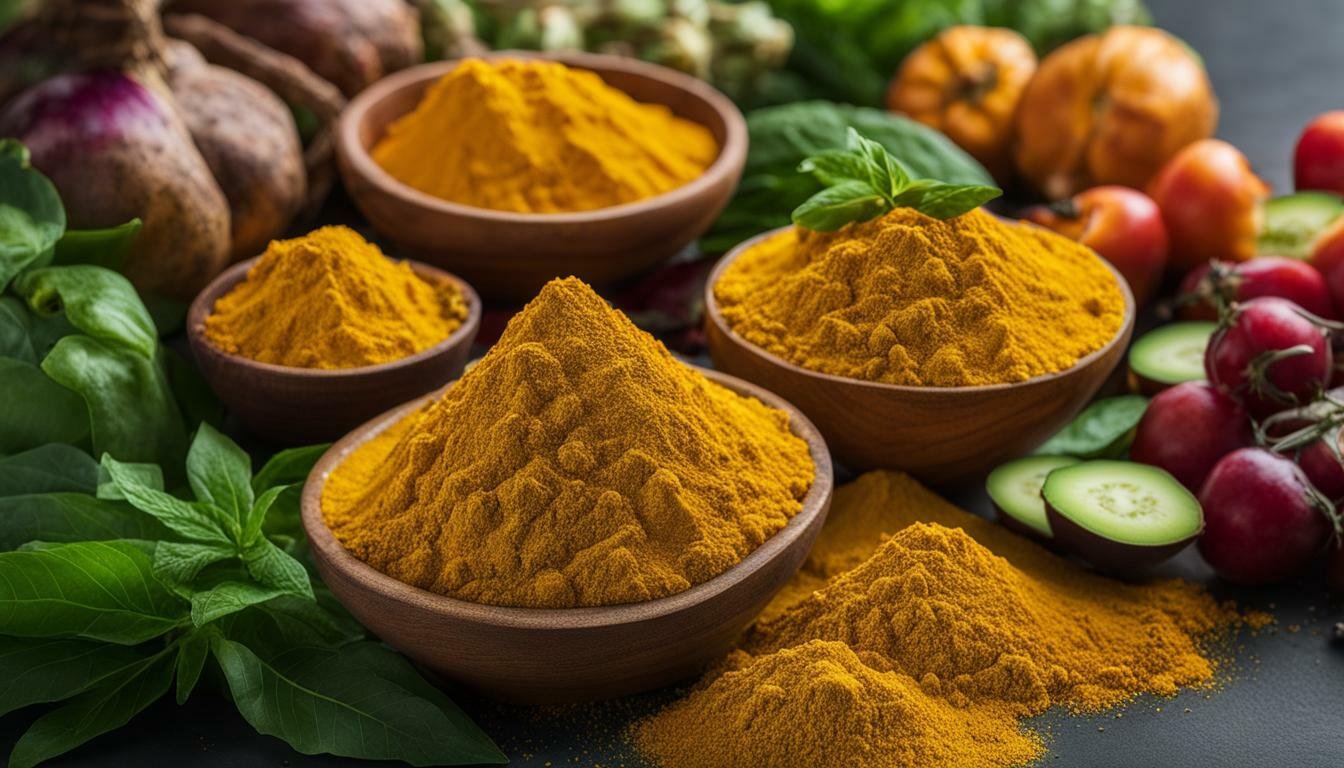Benefits of Turmeric for GERD Relief
If you’re looking for a natural choice to alleviate GERD (Gastroesophageal reflux disease) symptoms, turmeric may be the answer you’ve been searching for. This ancient spice, known for its vibrant yellow color, has been used for centuries in traditional medicine. But did you know that turmeric, specifically its active compound curcumin, has potential benefits for GERD relief? Curcumin possesses anti-inflammatory properties that can help protect the esophageal lining from the damaging effects of stomach acid. While scientific evidence is limited, the historical use of turmeric as an alternative treatment for acid reflux suggests its potential in promoting better digestive health.
- Turmeric, with its active compound curcumin, may offer relief for GERD symptoms.
- Curcumin has anti-inflammatory properties that can protect the esophageal lining from stomach acid damage.
- While scientific evidence is limited, turmeric has a long history of use in traditional medicine for digestive ailments.
- Turmeric can be consumed as a powder added to meals or as turmeric tea.
- Combining turmeric with black pepper may enhance its absorption in the body.
Understanding GERD and its Impact on Digestive Health
To understand why turmeric may help with GERD relief, it’s important to grasp the impact of acid reflux on your digestive health. Acid reflux, also known as gastroesophageal reflux disease (GERD), occurs when stomach acid flows back up into the esophagus. This can cause a range of uncomfortable symptoms such as heartburn, regurgitation, and chest pain. Stomach acid plays an essential role in the digestion process by breaking down food and killing bacteria. However, when the lower esophageal sphincter (LES), the muscle that separates the stomach from the esophagus, weakens or relaxes abnormally, it allows acid to escape from the stomach. The repeated exposure of the esophagus to stomach acid can lead to inflammation and damage to its delicate lining. GERD can have a significant impact on your digestive health. Chronic acid reflux can result in complications such as esophageal ulcers, strictures (narrowing of the esophagus), and even an increased risk of esophageal cancer. Therefore, it is crucial to actively manage and treat acid reflux symptoms to prevent long-term damage to your digestive system.
The Impact of GERD on Digestive Health:
| Effects of GERD on Digestive Health | |
|---|---|
| Esophageal inflammation | The repeated exposure to stomach acid can lead to inflammation of the esophagus, causing discomfort and pain. |
| Esophageal ulcers | Severe cases of GERD can result in the formation of ulcers in the esophagus, which can lead to bleeding and difficulty swallowing. |
| Strictures | Chronic acid reflux can cause the narrowing of the esophagus, making it difficult for food to pass through. |
| Barrett’s esophagus | In some cases, long-term GERD can cause changes in the lining of the esophagus, increasing the risk of developing a precancerous condition called Barrett’s esophagus. |
| Esophageal cancer | Although rare, untreated GERD can lead to the development of esophageal cancer over time. |
Understanding the impact of acid reflux on your digestive health highlights the importance of finding effective treatment options. While turmeric shows potential as a natural remedy for GERD relief, it is essential to consult with a doctor before incorporating it into your regimen, especially if you have underlying health conditions or are taking specific medications. Your doctor can provide personalized advice and recommend the most suitable treatment options to alleviate your acid reflux symptoms and protect your digestive health. Turmeric, the ancient spice known for its vibrant yellow color, holds promise as a potential treatment for acid reflux, thanks to the presence of curcumin. Curcumin is a compound found in turmeric that has been studied for its anti-inflammatory properties and potential benefits for digestive health. While scientific research on turmeric specifically for GERD relief is limited, its historical use as an alternative medicine makes it worth considering as a natural choice for better digestive health. To incorporate turmeric into your acid reflux treatment regimen, there are various options available. One of the simplest ways is to use turmeric powder as a spice in your meals. You can add it to dishes like curries, stir-fries, or even sprinkle it on roasted vegetables. Another option is to enjoy turmeric tea, which can be made by combining turmeric powder with hot water and a sweetener of your choice. It’s important to note that curcumin’s absorption in the body can be improved by combining turmeric with black pepper. Black pepper contains a compound called piperine, which enhances the bioavailability of curcumin. So, consider adding a pinch of black pepper when using turmeric in your meals or tea.
While turmeric shows potential as a natural remedy for GERD, it’s vital to consult with a doctor before incorporating it into your treatment plan. This is particularly crucial if you have certain health conditions or are taking specific medications. Your doctor can provide personalized advice and guidance based on your individual circumstances. Furthermore, it’s worth exploring other non-medicinal ways to alleviate acid reflux symptoms. Making dietary changes, such as avoiding trigger foods and eating smaller, more frequent meals, can help manage GERD. Increasing physical activity and quitting smoking are also beneficial for overall digestive health.
| Alternative Treatments | Description |
|---|---|
| Antacids | Over-the-counter medications that neutralize stomach acid and provide temporary relief from symptoms. |
| Proton Pump Inhibitors (PPIs) | Prescription medications that reduce the production of stomach acid to alleviate GERD symptoms. They are typically taken daily for a certain duration. |
| H2 Blockers | Prescription or over-the-counter medications that reduce the production of stomach acid, providing relief for acid reflux symptoms. |
Ultimately, it’s advisable to consult with a gastroenterologist, a specialist in digestive health, to determine the most suitable treatment option for your acid reflux. They will consider your medical history, symptoms, and individual needs to develop a personalized plan that effectively manages your GERD.
How to Incorporate Turmeric into Your GERD Relief Regimen
Now that you’re aware of the potential benefits of turmeric, let’s explore how you can incorporate this spice into your GERD relief regimen. Turmeric can be consumed in various ways, making it easy to include in your daily routine. An effective way to incorporate turmeric is by adding it as a powder to your meals. Sprinkle it onto roasted vegetables, soups, or stir-fries to enhance the flavor and reap the potential digestive benefits. Remember to use black pepper alongside turmeric, as it can enhance the absorption of curcumin, the active compound in turmeric. If you prefer a warm and soothing option, turmeric tea can be a great choice. Simply steep a teaspoon of turmeric powder in hot water for about 10 minutes. You can add honey or lemon for taste. Sip on this comforting tea to potentially alleviate GERD symptoms and promote better digestive health.
| Turmeric Benefits | Turmeric for Acid Reflux | Help with Acid Reflux |
|---|---|---|
| Anti-inflammatory properties | Potentially protect the esophageal lining from stomach acid damage | Alleviate GERD symptoms |
| May enhance digestion | Reduce acid reflux | Promote better digestive health |
Remember to consult with a doctor before using turmeric for GERD relief, especially if you have underlying health conditions or are taking specific medications. While turmeric can offer potential benefits, it’s important to ensure it is safe and suitable for your individual situation. Your doctor can provide personalized advice and recommend the most suitable treatment options for your acid reflux symptoms.
Alongside turmeric, there are other non-medicinal ways to alleviate acid reflux. Making dietary changes, such as avoiding trigger foods and eating smaller, more frequent meals, can help manage symptoms. Increasing physical activity and quitting smoking can also have a positive impact on your digestive health.
“Turmeric has shown potential in alleviating GERD symptoms, but it’s important to consult with a doctor before using it as a treatment. There are various non-medicinal ways to manage acid reflux, so it’s important to explore different options and find what works best for you.”
In certain cases, doctors may prescribe antacids, proton pump inhibitors (PPIs), or H2 blockers as alternative treatments for acid reflux. These medications can help reduce stomach acid production and provide relief from GERD symptoms. However, it’s always advisable to consult with a gastroenterologist to determine the most suitable treatment option for your specific condition.
Important considerations and Alternative Treatments for GERD
Before incorporating turmeric into your GERD relief plan, it’s crucial to consult with a healthcare professional to ensure it’s safe for you, especially if you have certain health conditions or are taking specific medications. While turmeric may offer potential benefits for relieving GERD symptoms, it’s important to note that scientific evidence supporting its use as an acid reflux treatment is limited. However, its historical use as an alternative medicine suggests its potential value for digestive health. Aside from turmeric, there are other non-medicinal ways to alleviate acid reflux and manage GERD. Making dietary changes can help reduce symptoms, such as avoiding trigger foods that may worsen acid reflux, including spicy or fatty foods, caffeine, and alcohol. Increasing physical activity and maintaining a healthy weight can also contribute to improved digestive health. Quitting smoking is highly recommended, as smoking can exacerbate GERD symptoms and damage the esophagus. In some cases, healthcare professionals may prescribe medications as alternative treatments for acid reflux. Antacids can provide temporary relief by neutralizing stomach acid, while proton pump inhibitors (PPIs) and H2 blockers can reduce acid production and heal the esophagus. However, it’s important to consult with a gastroenterologist to determine the most suitable treatment option based on your specific condition.
| GERD Treatment | Description |
|---|---|
| Antacids | Neutralize stomach acid and provide temporary relief from heartburn |
| Proton Pump Inhibitors (PPIs) | Reduce stomach acid production and promote healing of the esophagus |
| H2 Blockers | Decrease stomach acid production, providing relief from acid reflux symptoms |
While turmeric may offer potential benefits for GERD relief, it’s essential to consult with a healthcare professional before incorporating it into your treatment plan. They can provide personalized advice based on your specific health needs and medications. Additionally, making dietary changes, increasing physical activity, and exploring alternative treatments such as antacids, PPIs, and H2 blockers can also be effective in managing GERD symptoms. Remember to prioritize your digestive health and seek professional guidance for the most suitable approach for you. In conclusion, turmeric has shown promise as a natural option for GERD relief. This ancient spice contains curcumin, which has anti-inflammatory properties that can protect the esophageal lining from damage caused by stomach acid. While there is limited scientific evidence supporting turmeric as an acid reflux treatment, its historical use as an alternative medicine is worth considering. To incorporate turmeric into your GERD relief regimen, you can add turmeric powder to your meals or enjoy a soothing cup of turmeric tea. It is also recommended to combine turmeric with black pepper, as this can enhance its absorption in the body. However, it is crucial to consult with a healthcare professional before using turmeric for GERD, especially if you have underlying health conditions or are taking specific medications. In addition to turmeric, there are other non-medicinal ways to alleviate acid reflux symptoms. Making dietary changes, such as avoiding trigger foods and eating smaller, more frequent meals, can help manage GERD. Increasing physical activity and quitting smoking are also beneficial for improving digestive health. If lifestyle changes and natural remedies are not providing sufficient relief, a doctor may prescribe alternative treatments for acid reflux. Antacids, proton pump inhibitors (PPIs), and H2 blockers are commonly used medications to reduce stomach acid production and alleviate GERD symptoms. However, it is advisable to consult with a gastroenterologist to determine the most suitable treatment option for your specific condition.
Conclusion
In summary, turmeric and its active compound curcumin have demonstrated potential benefits for alleviating GERD symptoms due to curcumin’s anti-inflammatory properties. However, current scientific evidence is limited, so turmeric should not replace standard medical treatment. It’s best to consult a doctor before using turmeric, especially if you have underlying conditions or take medications. While study results are promising, more research is still needed on turmeric’s efficacy and safety for acid reflux relief. But adding turmeric as a spice or in tea may be an enjoyable way to supplement your treatment plan. Along with turmeric, making lifestyle changes like dietary adjustments can also help manage GERD naturally. With professional guidance, turmeric can be explored as part of a holistic approach for protecting your digestive health against the discomfort of acid reflux.
FAQ
What is GERD?
GERD stands for Gastroesophageal Reflux Disease, which is a chronic condition where stomach acid flows back into the esophagus, causing symptoms such as heartburn and regurgitation.
Can turmeric help with acid reflux?
Turmeric has been used for centuries to treat indigestion and may help treat acid reflux. The active compound in turmeric, called curcumin, has shown potential in reducing the severity of dyspepsia (indigestion) symptoms.
How does turmeric work for GERD relief?
Turmeric may help treat GERD by reducing the production of stomach acid and soothing inflammation in the esophagus. Curcumin, the main component of turmeric, has anti-inflammatory properties that can help alleviate symptoms of acid reflux.
Is there any scientific evidence supporting the use of turmeric for acid reflux?
Yes, there have been several studies conducted on the effects of curcumin in the treatment of acid reflux or GERD. A controlled trial showed that turmeric may be as effective as the drug omeprazole in reducing the symptoms and severity of acid reflux.
Can turmeric supplements be taken to treat acid reflux?
Turmeric supplements are available and can be taken to help with acid reflux. However, it is recommended to consult with a healthcare professional before starting any new supplement regimen.
Are there any potential side effects of using turmeric for GERD relief?
Turmeric is generally safe for most people when consumed in moderate amounts. However, high doses or long-term use of turmeric supplements may have potential side effects, such as upset stomach or interactions with certain medications. It is important to follow recommended dosage guidelines and consult with a healthcare professional if you have any concerns.
Can turmeric be used in combination with other treatments for acid reflux?
Turmeric can be used in combination with other treatments for acid reflux, such as lifestyle modifications and prescribed medications. However, it is important to discuss with a healthcare professional before combining different treatment methods to ensure effectiveness and safety.
How much turmeric should I take for GERD relief?
The appropriate dosage of turmeric for GERD relief may vary depending on the individual and severity of symptoms. It is best to consult with a healthcare professional or a registered dietitian to determine the right dosage for you.
Can turmeric be used as an alternative to omeprazole for acid reflux?
Turmeric may be considered as an alternative to omeprazole for acid reflux relief. However, it is recommended to consult with a healthcare professional before discontinuing any prescribed medications and using turmeric as a replacement.
Is turmeric safe for everyone to use for GERD relief?
While turmeric is generally safe for most people, it may interact with certain medications, especially those with anticoagulant properties. It is important to consult with a healthcare professional if you are taking any medications or have any underlying medical conditions before using turmeric for acid reflux.
What other benefits does turmeric have?
Turmeric has been used for various health benefits beyond GERD relief. It has anti-inflammatory and antioxidant properties, supports brain health, enhances digestion, and may help with joint pain and arthritis.





